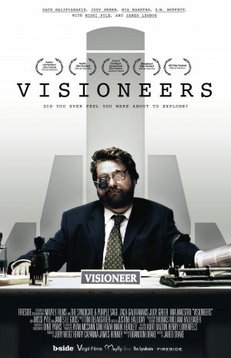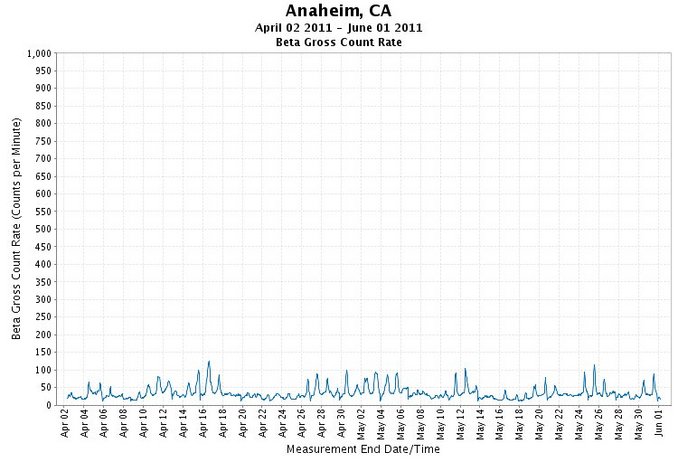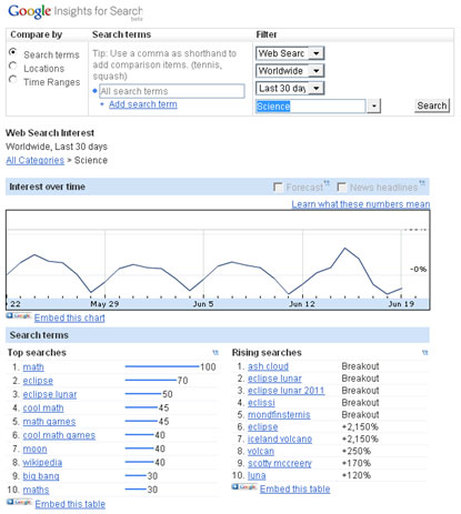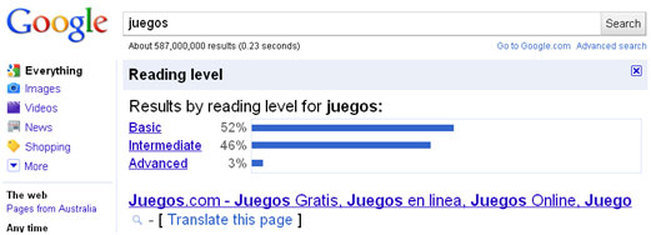 Technology is often blamed for making us lazier (think of vehicles, remote controllers, automatic things, etc.), but does it make us less intelligent? A quick, non-scientific study into Google’s top search terms might lead one to think so. A copy of the Excel analysis is at the end of this article. This evening, I was searching for lists of popular search terms or Tweets about technology so that I might write my next blog post about a hot topic of interest to the masses. Cheating, I know. While searching, I stumbled upon Google Insights, a website that allows one to look up the popularity of search terms in Google. I looked in the “Science” category (“Worldwide,” “Past 30 days”), and I was surprised to find words I would expect to come from an child in elementary school, such as "cool math" and "moon." Even considering that people may shorten and perhaps dumb-down the words they enter into the search box in order to keep things quick and simple, the words were still far more basic than what I would expect. Is the average Google user eight years old? Or does he/she search at an elementary school reading level, for some reason? Thus, I was moved to conduct a very quick, non-scientific study to determine the “reading level” of common Google searches. I used two methods and compared their results: 1. Google “Reading Level” (a new tool launched earlier in 2011), and 2. the Flesch-Kincaid Reading Grade Level (calculated according to the formula at: http://homeworktips.about.com/od/homeworkhelp/a/readinglevel.htm). First, I chose a sample of Google search terms to study. In a pseudo-random fashion, I chose the top ten most popular search terms worldwide, in the past 30 days, provided by Google Insights for the every 7th category listed (there were 27 categories in total, and I didn’t want to study them all). The categories were: Finance & Insurance, Lifestyles, and Science. Below is a screenshot of the top ten Science search terms as of June 20, 2011. Next, I looked up each search term on the respective top ten lists and used the “Reading Level” feature in Google Advance Search (http://www.google.com.au/advanced_search). Here is an example of the reading level results for the term “juegos,” which was the 10th most popular search term in the Lifestyles category. I also used a formula (referenced above) to calculate the Reading Grade Level of the search terms. The formula looks at both the total number of words in a sample of text (in this case, just one or two words in the search term) as well as the number of syllables in each word. Considering that the formula is designed for full pieces of text—paragraphs and sentences—its informative-ness may be limited when applied to brief, one- or two- word search terms. I found that the average Google Reading Level was Basic-Intermediate, with a slight lean toward Intermediate, according to Google's own Basic-Intermediate-Advanced ranking system. The average Reading Grade Level was fourth grade! These findings can be interpreted in many ways. Perhaps Google indeed "makes" us dumb. Perhaps Google has low standards for what it calls “Intermediate” (it appears to be around the 4th grade level). Maybe the average Google user is in fact a fourth-grader (unlikely), or middle-aged men pretending to be fourth-graders (let's hope not). Or the results may reflect a tendency for all online content, no matter how intelligent the target audience, to be simplified due to the impatience with reading on an LCD screen. More likely, we may be witnessing a phenomenon wherein shorter, simpler phrases are more likely to appear in greater number. Even though most people may enter much longer, more advanced phrases in the search box, the longer the phrase, the less likely it is that all words in that phrase exactly match those in another phrase. So if only perfectly matching phrases are counted as a single search term, fewer-word search terms, that are shorter and easier to spell, are more likely to be found in greater number. For example, considering a one-word search term, on a given day, there might be 100 alternate spellings of "rhinoceros" and 10 correct spellings of "dino." Even though there are a lot of smart adults out there misspelling rhinoceros, "dino" will come up as the top search term, making it look like we're all in kindergarten. Also, it is possible that Google only shows "key words" that originally appear in longer phrases. Nonetheless, it is an interesting study of a rather simple observation: that the top search terms in Google seem to be very, very simple. Many, in fact, are one word and one syllable. While the tone of this paper is light-heartedly mocking Google’s intelligence level, or perhaps its affect on our intelligence levels, I actually think Google is a blessing. If it weren’t for their incredible wealth of data, and cool tools including Insights and the new Reading Level search function, this little study wouldn’t have been possible. If anything, technology such as Google allows us to spend our mental and physical energy on other things. Happy searching! PS, For curiosity, I looked up the Reading Grade Level of this very article on the website: http://www.online-utility.org/english/readability_test_and_improve.jsp. It came out as just under 10th grade level. Give it a try!
 David Gobel On June 9, I had the pleasure to speak with Mr. David Gobel, Founder and CEO of the Methuselah Foundation, a non-profit dedicated to furthering life extension research. For those unfamiliar, life extension (or “longevity”) research is scientific study of how to allow humans to live healthier, longer lives. An example mentioned in our conversation is creating artificial organs to replace organs that become diseased. Other areas include searching for the root causes of aging, determining which genes are possessed by animals that live really long lives, et cetera. In all, life extension research is a nascent, cutting-edge field that appears to be growing in demand, based on the increasing funding of organizations such as MF.
In this interview, we learn about Mr. Gobel’s motivation for founding the Methuselah Foundation, the economics of the budding longevity funding industry, and the strategic course of the Methuselah Foundation. Q: First for those who don’t know much about you and your background, could you tell us how you got to where you are now as the CEO of the Methuselah Foundation?  Alexander Raths. 123rf.com Gardening has become one of several hobbies that I have taken up while looking for jobs. It has several benefits: It's an excuse to expose my eyes to light other than the glow of my laptop. It's a way to uncurl the question-mark my body becomes when sitting at the computer all day. And best of all: it's free and it creates food!
Here are some other things I have recently done to stay sane: - Art! I'm a longtime artist, and graduating has given me a chance to get back to it. Pros: it's free and you can do it anywhere. Just pick up a pen and paper and draw something you see around you, or from your imagination. - Cooking. Again, an activity that usually saves money and passes the time. I recommend trying slightly (or totally) new recipes each day or week. Tip: change only one or two ingredients at a time, so you can keep track of what the change actually does to the meal. In science, the ingredient being changed is called the "experimental variable," And in math, the ingredient would be the "unknown variable" in an equation, which can be solved as long as there is only one unknown variable. - Meetups or parties. A great way to get out and socialize that can even help the job hunt. I have gone to political events, meetups, and friends' parties. So far I have met a few people at such events that have become professional connections. -Clubs/activities/contests. If you are still tied into a school, or even if not, find one and be a part of a club. After graduating, I participated in a business competition at my university, and I have become more active in clubs for which I previously didn't have time. Also a good networking device. - Blogging. Doin it right now. Keeps the mind active on something other than interviews and resumes. -Exercise or sports. A friend of mine exercised heavily while looking for work, apparently getting into great shape. I've done it a bit, but the downside in my case and for most is that gyms usually cost mo jo. But these are great options. There are a million other ideas, but these are a few that work for me.  In creating my new blog (this one), I discovered a few great resources for those struggling to come up with a meaningful but short blog, website, or domain name.
1. The first resource is the 2- and 3-letter word lists from the San Jose Scrabble Club: http://www.yak.net/kablooey/scrabble/2letterwords.html http://www.yak.net/kablooey/scrabble/3letterwords.html Browsing these lists will not only inspire cool site names, but also will sharpen your Scrabbling skills. Ah, good ol' Scrabble. ("Ah" is a valid Scrabble word!) 2. The next is this handy website of abbreviations: www.abbreviations.com It allows browsing by category, including stock ticker symbols, professional terms, etc. This is especially handy for those affiliated with an organization or creating a website for professional purposes. 3. Or you may take the route that I did: IM/text messaging-inspired abbreviations/misspellings. For example, I considered intentional misspellings such as "trooth" and "lern" to show my mix of humor and intellectualism. Happy naming!  This evening I saw The Visioneers, a 2008 film staring Zach Galifianakis, one of my recent favorite comedian/actors. Zach does not disappoint. (Free on Hulu.com)
In his characteristic style, Zach finely balances dark with silly, playing a middle manager of a corporation intent on maximizing productivity while ridding its employees, and the whole world, of their dreams. On the scale of silly vs. dramatic/dark/thoughtful, this film lies between The Hangover and It's Kind of A Funny Story. You can tell a good humorist when a dramatic scene, such as the climax of this film involving Zach and a female co-star, can be played in a silly manner, giving it humor, but not taking away from the deep emotion of the scene. On the negative side, the film moves a bit slowly, and I do not agree with the film's many political/economic implications, including that corporations seek to take over the world and rid people of happiness, or that the government helps promote the profit-seeking strategies of corporations. On the contrary, what I observe is that the same force of competition that motivates corporations' productivity policies is that which, in the long-run, causes these policies not to go overboard; the "non-corporate," casual work atmospheres of companies like Google are good examples of this principle. And I have only known the government to be an opponent of the private sector, with taxes and regulations that limit, not enhance, profit-making. And if a particular regulation happens to enhance the profits of a certain company or industry, as in the case of the 2009 US bank bail-outs, it is surely acting against the profitability of other companies, industries, or individuals, and is on the whole deleterious. Keep up the good work, Zach! This evening I attended Nullify Now!, a libertarian/tea party social and activism event that was held near the Staples Center in downtown Los Angeles (http://www.nullifynow.com/losangeles/). I had the pleasure to talk to almost all of the speakers, including the main attraction, Thomas E. Woods, Jr.
The attendees: Mostly a nice crowd; 30-60 -ish. I spoke to around 30 people, and they were a lot of small business, entrepreneurial, artsy, or retired types. The speakers: There was a substantial crowd that was laughing and clapping a lot, but I felt the speakers were a little redundant and lacking depth. Mr. Thomas Woods, for example, did a lot of ripping on Mitt Romney and Hilary Clinton. I can understand this, but character-bashing is easy. I like to hear ideas. What is wrong with Mitt's/Clinton's ideas, and why? What are better ideas, and why? And make it fresh. In all, a fun night.  (photo by graur codrin at http://www.freedigitalphotos.net/images/view_photog.php?photogid=982) Are there certain products and services in the world that would not exist if not for weaknesses of some individuals, such as dishonesty, fraud, impatience, irresponsibility, et cetera?
Here's a list of some products and services (simply, "products" from now on) that may fit this description: -Check cashing services/credit cards--I understand these services to profit by the mistakes of customers--not paying bills on time, thus being charged interest. -Most gambling products--exploiting those looking for escape, prone to addiction, etc. -Fat burners and other nutritional supplements that claim to do what they cannot--exploiting impatience and lack of scientific education. -Cigarettes and other dangerous consumables--exploiting those who value a buzz or the image the product provides over their health. -Sunbathing products and tanning beds--same as above. -Those damned "free trial for a month, but then we'll slap you with a huge monthly credit card charge when you forget to cancel" subscription services--exploiting those who don't know better. -What else?? Let's not forget black markets. While bootlegged products take advantage of a lack of respect for property rights, other "black markets" may reflect our perseverance to obtain products that are banned by governments. Also, many products may be "rational" in certain quantities, settings and contexts, but the same products may be irrational if purchased too often, or in the wrong context. An example of this might be the candy at the check-out line at a store, which can either target (less rational) impulsiveness or (more rational) post-shopping hunger, or clothing--one pair of dress shoes is handy, but twenty can be excessive. Or mid-day infomercials selling products that you can surely find online for 1/10 the price--not smart unless perhaps you don't have online access or are not web-savvy, in which case it might be your only practical way of obtaining that one-of-a-kind 50-piece engraved-handle hunting knife set. In sum, I am fascinated by this topic, which falls under psychological economics/decision-making science, more recently dubbed "neuroeconomics." Let me know what you think.  The radiation levels detected in California, shown on EPA's "RadNet" website (http://www.epa.gov/radiation/rert/radnet-anaheim-bg.html#beta) do notshow the radiation levels before the date of the earthquake in Japan, March 11, 2011. Above is an example graph of radiation in Anaheim, CA since the earthquake on March 11. This historical data is what's called a "baseline" in science and other fields--it is needed to know how much change in radiation there has been since the catastrophe. Without seeing the data, we just have to take their word for it that it's a small, harmless amount. Granted, the radiation in the air would have needed a few days to arrive to CA via the jet-streams--it may not have shown up instantly on March 11. In fact, somewhat higher levels of radiation were first reported in California on March 18: http://sacramento.cbslocal.com/2011/03/18/first-radioactive-particles-from-japan-reach-california/. So March 11 through 18 can be treated as a baseline period, and in the graphs that EPA has published, no clear increase in radiation can be seen during that period. However, as a true science geek, I have dug a bit further. Gamma radiation, one of the forms of radiation emitted by the damaged nuclear power plants in Japan may not need to travel "on the wind." According to the EPA website: "gamma photons travel at the speed of light and can cover hundreds to thousands of meters in air before spending their energy." (http://www.epa.gov/radiation/understand/gamma.html#properties) They can also pass through water, and many solid objects, for a certain distance, depending on how much energy they had to start with. I don't know how much energy the gamma rays emitted from Fukushima had, so it's hard to say whether a spike in radiation may have occurred from March 10 to March 11, 2011. In short, we wouldn't need to speculate about these things if the EPA would simply publish this data, if they have it to publish. It's human nature, and healthy, to become a tad inquisitive when one isn't given all the data, so to speak. | |||







 RSS Feed
RSS Feed